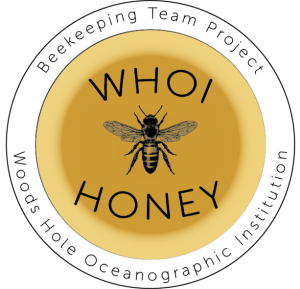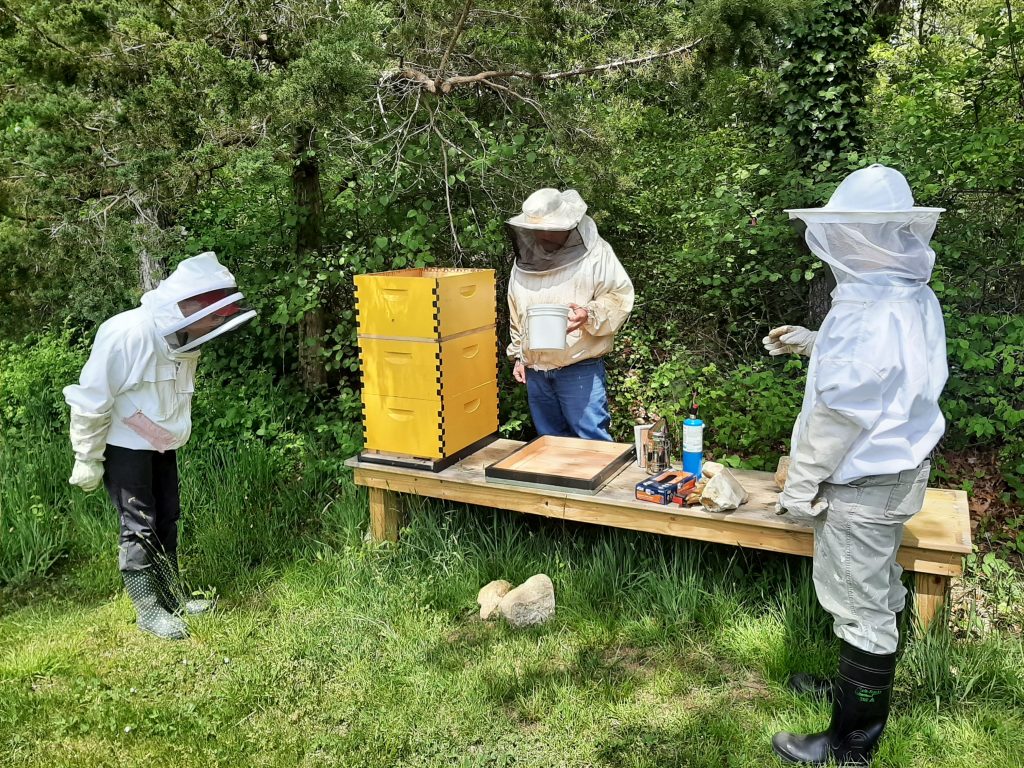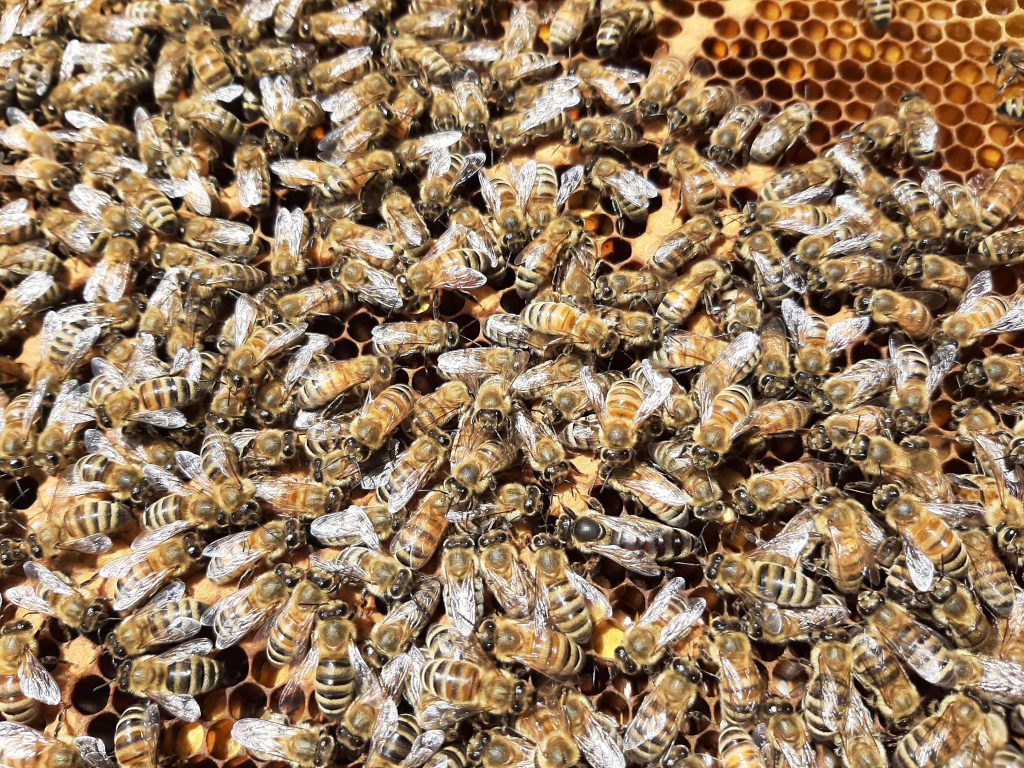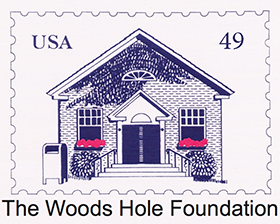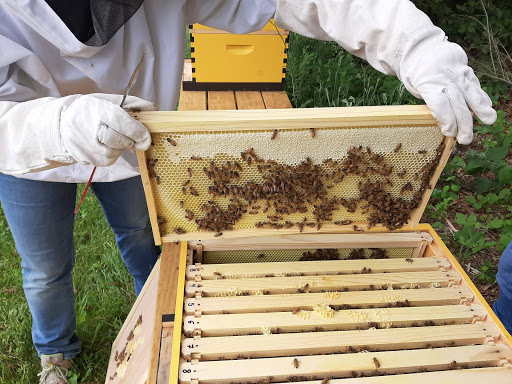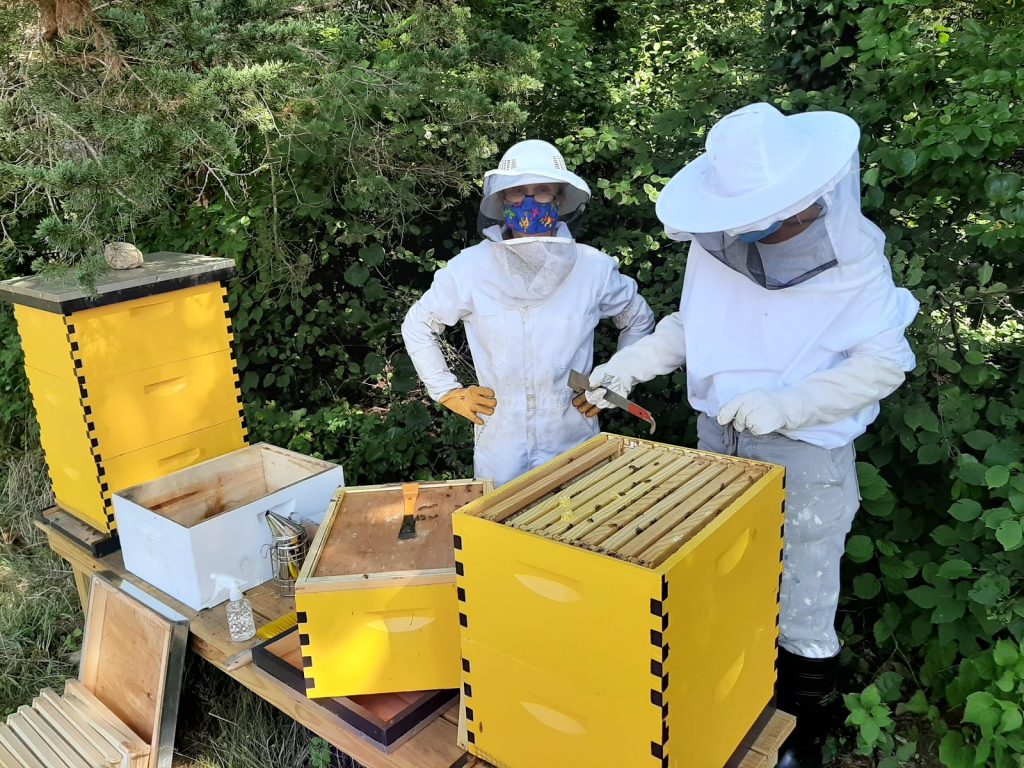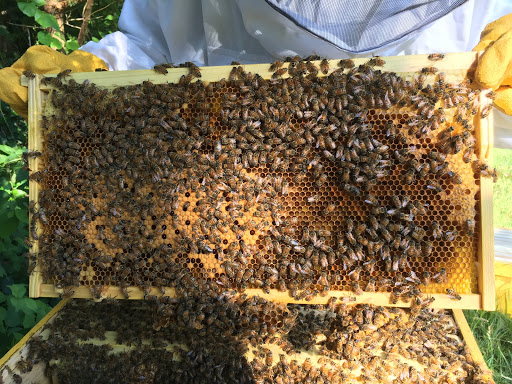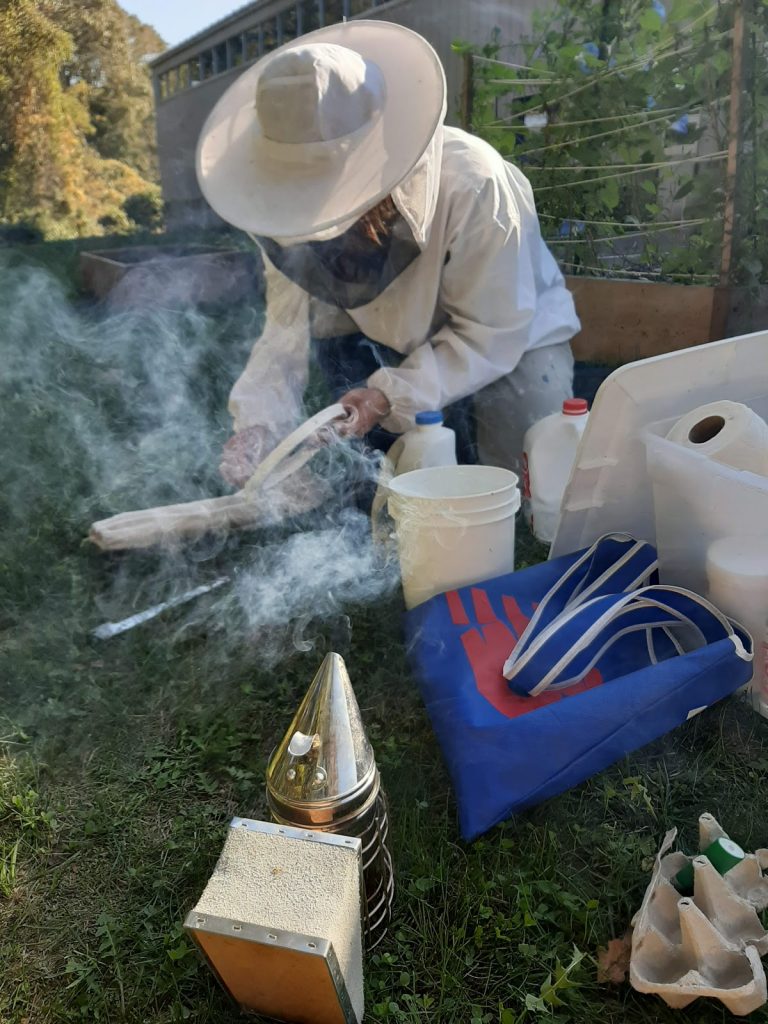Bees at WHOI
Bees are critical to the ecosystem, providing pollination that is vital for plant survival and the production of our veggies and fruits. The WHOI beekeeping group is an open and welcoming group of WHOI staff and friends with interests in bee husbandry and related pollinator activities. The group started in 2019 and has successfully brought two bee hives to the WHOI Quissett campus. In 2022 a new hive was started on the Village Campus.
Join us!
We are continuously welcoming new committed beekeeper hands! Whether you have kept bees your whole life or have never seen a bee from close by, you are always welcome. Please contact dkinkade@whoi.edu if you want to join. If you would rather stay updated from a distance, you can always subscribe to our mailing list or explore this webpage.
Beekeeping Pep Talk Lunch n Learn
Wednesday, March 27, 2024 Hybrid
In person at Carriage House and on Zoom: https://whoi-edu.zoom.us/j/93575859108
WHOI’s beekeeping project started in 2020, with hives now on the Quissett Campus and in the Village. This talk will center on the main tasks required of beekeepers month by month, and how interested community members can step in and help with the project at any time of year.
Anne is a retired NOAA scientist and certified Master Beekeeper, and has been keeping bees for about 20 years as well as mentoring new beekeepers for many years. She has been teaching Introductory Beekeeping beginning in Woods Hole in 2023 and now also in West Barnstable.
At this Lunch and Learn, Anne will discuss rules of thumb for beekeepers – what to do when, and why. A bee colony varies widely in composition and size over the year, and is very responsive to changes in the environment. In addition to using rules of thumb, the beekeeper can benefit from using environmental cues to help guide management decisions. The talk will be geared towards those with little background in honey bee biology or beekeeping.
This speaker is sponsored through 2019 funding from the Woods Hole Foundation.
Village Hive Pilot Project 2022
After 2 successful years of beekeeping at the Quissett campus and with support from the Woods Hole Foundation, the WHOI Beekeepers Group is planning a pilot project in the Village Campus in 2022. This project will start out with placing 1 new hive in proximity of the community gardens.
In previous years, we have been fortunate to harvest enough honey to distribute via auctions and WHOI Departmental Christmas events with proceeds donated to the Falmouth Service Center. We hope this Village hive will be just as productive, and will provide a learning experience for new, interested beekeepers.
Happy Spring! - WHOI Beekeepers Ellen Bailey, Danie Kinkade, Bethany Fowler, Neel Aluru and Karen Soenen
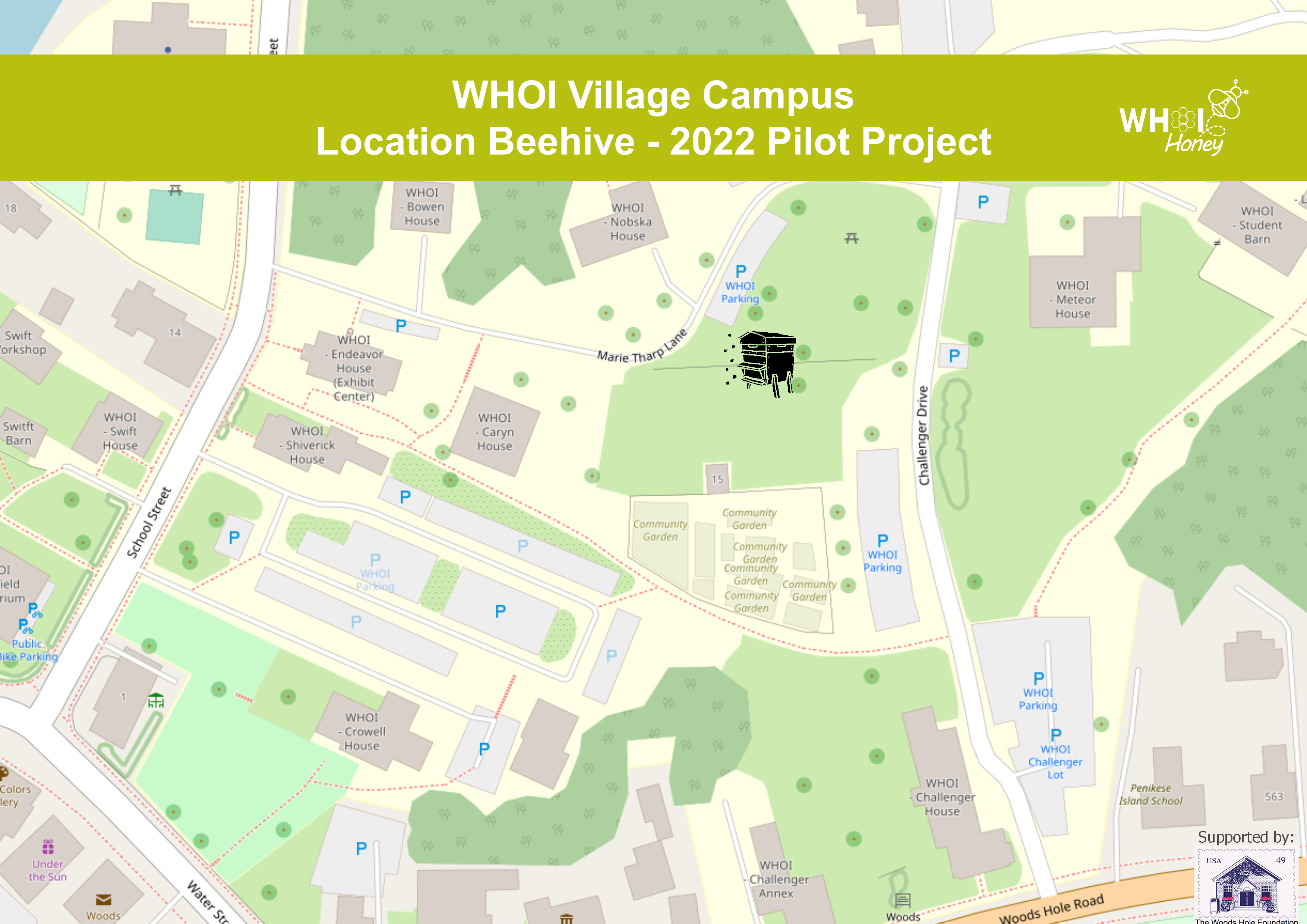
2021 Woods Hole Foundation grant
The WHOI Beekeepers have been awarded a 2021 Woods Hole Foundation grant!
The award will help maintain and grow a small beekeeping endeavor on the WHOI campus. Funds would cover supplies for feeding, pest (disease, mites, etc.) control, and honey extraction and storage. This will enable us to keep donating honey sales proceeds to local services and/or charities, rather than depending on honey sales to maintain our hives.
We believe our group’s sustained offering of opportunities for education, outreach, and hands-on experiential learning helps build awareness in others in the Falmouth area to become involved in bee husbandry. This interest can potentially generate growth in the number of hives in the Falmouth area (encouraging general bee health on Cape Cod), and inspire gardeners to plant more native pollinator species.
The first year of WHOI beekeeping
Two beehives got installed on the WHOI campus in April 2020 by a group of volunteers and have been maintained ever since. Two separate species were selected based on their gentle nature, resistance to diseases, and honey production: Saskatraz and Carniolan.
The bees were dependent on additional sugar syrup until June, but thrived on their own all the way through summer. They got through the summer drought without swarming or being robbed by other bees. Fall feeding started again by the end of September.
The hives were opened about 16 times throughout the year and these times were spent to check the hives, capture data about them, and teach the beekeeping trade to new beekeepers. All the frames showed excellent patterns in drone cells, brood and capped honey cells, although it was quite a challenge to spot the queens. Rodents were being kept out of the hives using mouse guards.
Varroa mites are a big concern for the survival of a bee population. We tested the infection rate of our bees using the sugar shake method. Half-cup of bees were sampled and rolled in powdered sugar, which loosens mites from the bees. By gently shaking these sugar-covered bees, mites fall onto a counting board. The bees got checked twice and both mite checks yielded high enough numbers to treat with Formic Acid strips. The vapors kill mites but not bees. Hives received one more varroa treatment right before winter in the form of an oxalic acid drip.
One box of frames and honey was taken from the Saskatraz bees to extract honey. Fewer boxes are easier for the bees to keep warm throughout the winter. A candy board was added on top of the hive as extra winter food as well as a quilt box filled with burlap for extra insulation.
The last step in the whole process is honey going from frame to jar. Cells in a honey frame are uncapped using a hot uncapping knife and fork. Honey is extracted from these uncapped frames using a centrifuge. The honey then flows into a strainer and is being poured into jars. Et voila! That is how jars with honey are being born! Fingers crossed these little ladies now survive the Cape Cod Winter!
A recorded lunch ‘n learn on our bees during the first year can be found here.
